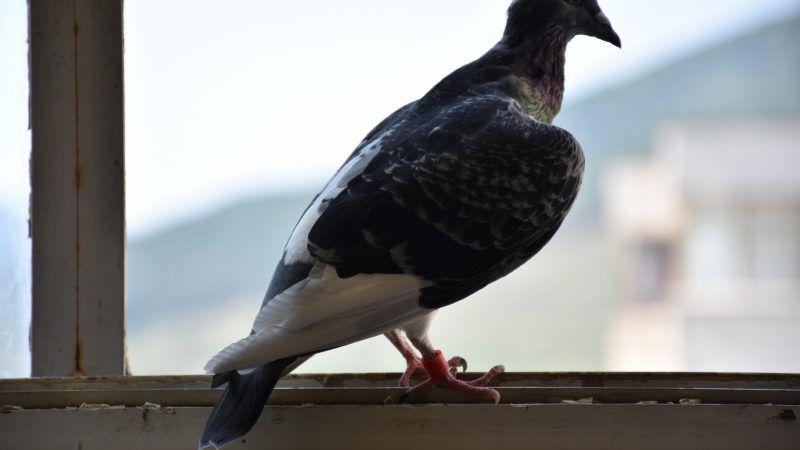Union Sues Over Approval of 1,000-Unit Silicon Valley Housing Project, Arguing Building's Shiny Windows Will Kill Too Many Birds
An environmental lawsuit holds up yet another residential development in housing-starved California.

Dangerous cancer-causing construction materials. Legions of dead birds. These are some of the potentially disastrous consequences that could allegedly arise if a major new construction project in Sunnyvale, California, is allowed to break ground.
That, at least, is what the Laborers International Union of North America (LIUNA), Local 270—which represents unionized construction workers in the area—claims in a new lawsuit it has filed against the City of Sunnyvale and its city council.
At issue is Sunnyvale's approval of a 1,051-unit residential project being sponsored by the Irvine Company. The developer is proposing to tear down a collection of office buildings in an industrial area of the city and replace them with a mix of apartments and townhouses.
Additional housing in the ultra-expensive Silicon Valley community—where the median home price sits at $1.7 million—might sound like a good thing, particularly given that 58 of the project's new units would be rented out at below-market rates to low- and moderate-income tenants.
But the LIUNA lawsuit claims that moving forward with the project without additional environmental review could cause irreparable harm both to future residents and to area wildlife, particularly birds, who allegedly will be killed en masse by flying into the proposed building's reflective windows.
The union can hold up the Irvine project because of the California Environmental Quality Act (CEQA), a decades-old state law that requires government agencies to study projects for any potentially significant environmental impacts they might have and, if any are found, to propose changes that would mitigate those impacts.
The purpose of the law was to protect the state's natural environment. But many people contend that CEQA is often hijacked by self-interested parties who want either to kill off unwanted developments or to extract concessions from a developer.
Indeed, LIUANA's Local Angeles local is currently defending itself from just such a charge in a federal racketeering lawsuit. Back in January, the developer Icon sued LIUANA Local 300, alleging that the union had used frivolous CEQA complaints to delay one of the company's L.A.-area projects until Icon agreed to hire all-union labor. This practice, Icon's suit contends, violates federal racketeering laws.
The Sunnyvale drama started back in December 2018, when LIUNA filed a comment letter claiming that a 326-page draft environmental impact report (EIR) issued by the city for the Irvine project failed to adequately study all potentially significant environmental impacts. Ironically, LIUNA's letter alleging that the report was insufficiently detailed itself contained no specific complaints.
In February 2019 the city issued a final EIR for the Irvine project, prompting LIUNA to raise a far more extensive set of objections.
In a March 24 comment letter, the union argued this final EIR failed to study the negative health effects that might arise should formaldehyde-containing construction materials be used when building the Irvine project.
LIUNA also argued that some 509 birds would kill themselves each year by flying into the project's overly reflective windows.
The letter also claimed that the city did not do enough to study the environmental impact of future residents' pet cats, who might kill even more birds while pooping out dangerous parasites.
In April, environmental consultants hired by the city filed a response arguing that LIUANA's experts relied on outdated studies that didn't take into account newer, stricter regulations of construction materials. They also argued that the Irvine project was similar enough to nearby buildings that it didn't pose any new risks to birds in the area, that it abided by the Sunnyvale's "Bird Safe" design guidelines, and that concerns about residents' cats were entirely speculative.
On April 8, the city's Planning Commission forwarded the Irvine project to the Sunnyvale City Council, recommending its approval. A few weeks later, the council voted 7–0 to approve the project. Its administrative remedies exhausted, LIUNA filed a CEQA lawsuit in late May, demanding that the approval be overturned so that yet more environmental analysis can be done.
The project could now be held up for months, if not years, while the case works its way through the courts, potentially costing its developer millions of dollars and denying Sunnyvale residents of additional housing options.
Whether LIUNA's lawsuit is motivated by environmental concerns or self-interest is impossible to say definitively.
According to a blog post written Sunnyvale City Councilmember Michael Goldman, Irvine has already agreed to hire local union labor for its project. That said, it's not unheard of for a union local to hold up a project with CEQA appeals and lawsuits until their members are guaranteed the work.
Even if you assume that LIUNA's objections are accurate and made in good faith, there is still a question of trade-offs. At what point does the well-being of birds outweigh the human need for housing?
Rent Free is a weekly newsletter from Christian Britschgi on urbanism and the fight for less regulation, more housing, more property rights, and more freedom in America's cities.


Show Comments (112)